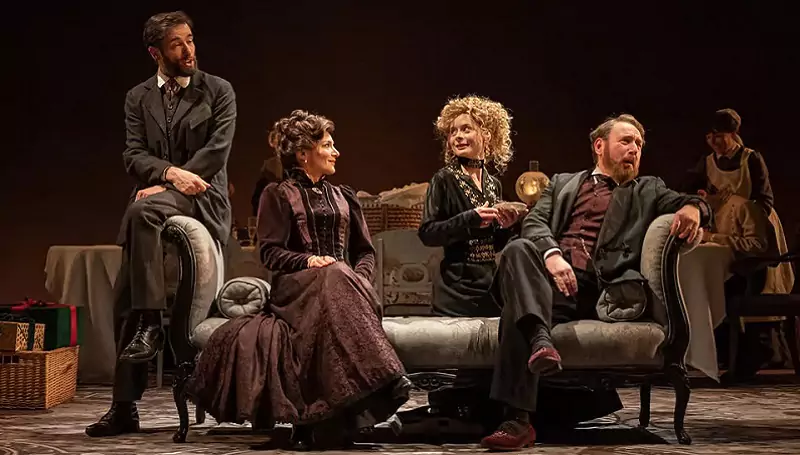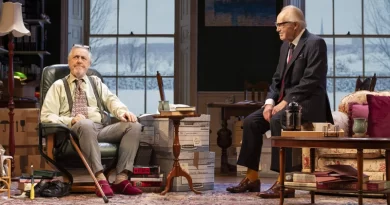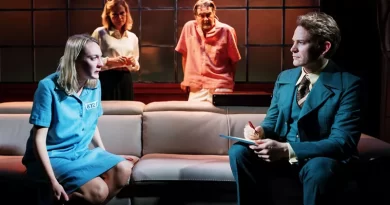“Leopoldstadt”, Wyndham’s Theatre
2 August 2021
Neil Dowden in the West End
Often labelled as Britain’s greatest living playwright, the eight-two-year-old Tom Stoppard is not resting on his laurels. His new play Leopoldstadt – his first for five years – is big in every sense: with an epic historical sweep of over 50 years, it bulges with weighty issues and boasts a 30-plus cast in its West End premiere at Wyndham’s Theatre. Stoppard himself has said that it is his most personal play, reflecting as it does for the first time his Jewish family background in Central Europe. He has also said that it may be his last – and if it doesn’t match his best work such as Arcadia, The Real Thing, and Rosencrantz and Guildenstern Are Dead, it shows he has lost none of his intellectual ambition.
Leopoldstadt tells the dramatic story of four generations of the Jewish Merz family against the backdrop of extreme fluctuations of anti-Semitism in Europe. When we first see them, at the turn of the twentieth century they are thriving, after having originally fled from pogroms in the east to the safety of the Jewish quarter of Leopoldstadt in Vienna (with Jews having been given the same rights as Christians by Emperor Franz Joseph I in 1867). Since prospering with their textile business, they have moved to a middle-class area of the city, apparently assimilated into Austrian culture. Indeed, the eldest son Hermann (who now runs the family firm) has married a Catholic and has himself converted to Catholicism, believing that his ethnicity will no longer be a bar to his full acceptance by high society. But his complacency is shattered by an encounter with a racist, upper-class Austrian dragoon who refuses the dishonoured Hermann’s challenge to a duel because it is beneath him to fight a Jew.
The action then moves to 1924. The Austro-Hungarian Empire is no more (a casualty of the Great War, in which Hermann’s son was wounded and his nephew was killed fighting for their adopted country), but the Merzes are still doing well financially despite the worrying rise of right-wing nationalism. Fast-forwarding to 1938, however, disaster strikes: with Austria having recently being annexed by Nazi Germany, on Kristallnacht the family house is raided by Stormtroopers who force them to move back to Leopoldstadt, which is now a ghetto, prior to the inhabitants being transported to concentration camps. The final scene takes place after the end of the post-war Allied occupation of Vienna in 1955, as the surviving members of the youngest generation struggle to come to terms with so many of the family having been murdered during the Holocaust.
Stoppard has written on this large scale before, notably in his The Coast of Utopia trilogy set in pre-revolutionary Russia. He has also written about his birth country, Czechoslovakia, especially in Rock ‘n’ Roll, one of several works depicting human rights abuses by Soviet communism. But Leopoldstadt is the first time on stage that he has addressed far-right anti-Semitism and his own Jewish heritage, which he only fully learned about in the 1990s. Although his immediate family just escaped the German invasion, many relations met their fate in the Nazi death camps. Stoppard has said that he does not feel like a survivor because he was too young remember these horrors and was brought up to be English, but the play does feel very cathartic.
Despite its broad canvas, there is a certain intimacy in the work, all of which takes place in one family home. Disorientingly, this is not actually in the location that gives the play its title, but using the name Leopoldstadt perhaps suggests that Jewish people could never be sure of being securely integrated into the wider society. Whilst Stoppard succeeds in presenting a panoramic overview, the necessarily episodic nature of the play sometimes frustrates in the amount of its historical exposition and also in the sketchiness of a lot of the multitudinous characters. Moreover, because the children when grown up are played by different actors there is inevitably a lack of continuity, while it is tricky to identify everyone and work out how they are all related in successive time periods.
As always, Stoppard fills the play with stimulating intellectual debate – including contemporary cultural references to Mahler, Schoenberg, Klimt, Schnitzler, and Freud – as well as a lot of humour. But, as befits its sombre historical background, there is much more pathos here than usual with three intensely emotional confrontations that belie Stoppard’s reputation as being purely a cerebral playwright. Family portraits and photographs assume an important part in the play (indeed we see the Merzes posing for an unseen camera). Also significant is a recurring rollcall of names, most powerfully expressed in the way the brutally efficient Nazi bureaucracy is counterpointed with an elegiac memorial for those who have died.
Patrick Marber (who in 2016 directed Stoppard’s Travesties at the Menier Chocolate Factory and a subsequent West End transfer) marshals the huge cast with skill, clearly presenting Stoppard’s grand vision (including projections of period photographs), though the production is sometimes rather too measured. Richard Hudson’s elegant design shows how the Merz bourgeois home changes over the course of half a century. Neil Austin’s lighting diffuses the family in a retrospective mood, while Adam Cork’s sound effects evoke menacing off-stage action of breaking glass and gunfire.
This is very much an ensemble show, with the focus on the mixed fortunes of the extended Merz family rather than individuals. But Adrian Scarborough excels as the social-climbing Hermann whose hopes of being accepted are dashed by bitter personal experience, while Faye Castelow also impresses as his unfaithful wife Gretl later overcome by guilt. The playwright’s son, Ed Stoppard plays the gentle mathematics academic Ludwig whose belief that reason and order will prevail in civilization is cruelly disproved. And Luke Thallon doubles as the sneeringly Aryan lieutenant Fritz and as Leo who after escaping to England has distanced himself from his Jewish heritage – surely a portrait of the artist as a young man who now, many decades on, belatedly looks back to his roots in a play that emphasizes the importance of remembering the past.









